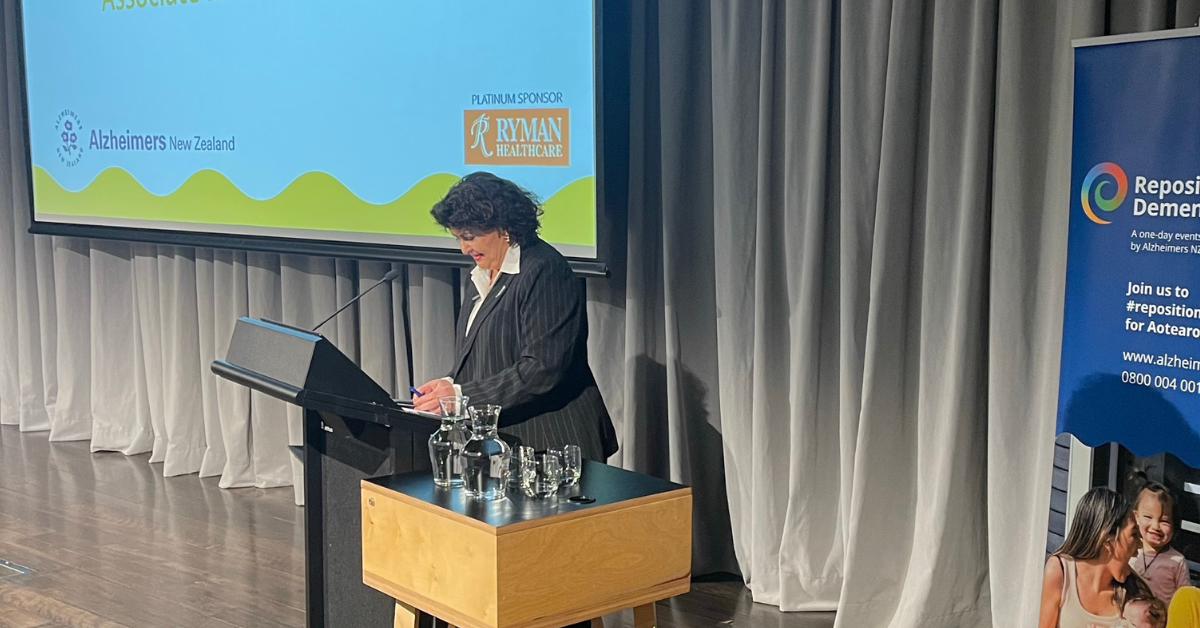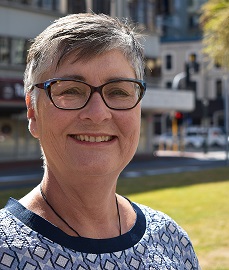Practical solutions to a common cause
Alzheimers NZ Chief Executive Catherine Hall contemplates what's next at the latest one-day event Repositioning Dementia by Alzheimers NZ, in September as part of World Alzheimers Month.


It’s a real pleasure to see so many of you here today, in the room and online for our fourth and last event in this series, Repositioning Dementia: What’s next?
And that is a very good question! Unfortunately, I don’t have any easy answers.
Our Dementia Declaration says, the lives of people living with dementia matter.
The problem is – even now in 2024 it doesn’t always seem that way. The dementia journey is often hard and lonely, and you can be forgiven for thinking the system is stacked against us:
We know from the ADI report into attitudes to dementia we’ve just released that 1/3 of people with dementia avoid social situations and almost 50% of carers stop accepting invitations from friends and family making loneliness and isolation even worse at such a tough time in their lives.
We also know that:
- it’s still hard to get a diagnosis
- 30,000 kiwis – a population the size of Queenstown – can’t get the community dementia help they need because community-based Alzheimers and dementia services are still underfunded and struggling
- care partners and whānau still struggle to get any help or support.
When I spoke at our event in March, I said then that I’d found that speech hard to write because things in the sector were very much in limbo, with a new Government and a new Minister.
Now – six months down the line – not too much has changed, I’m afraid.
Alzheimers NZ submitted to the Health Select Committee’s inquiry.
We offered solutions to the Aged Care Funding and Service Models Review.
We’ve provided advice to Ministers.
And we’ve written directly to Health NZ Commissioner Dr Levy, highlighting the initiatives we can bring to the table and noting our willingness to work with Government to make those solutions produce the results they are looking for.
We also made the point that the sector’s willingness to engage and work collaboratively has felt very much like one-way traffic when it comes to having meaningful part in fixing the broken health of older people system.
I’ve recently been assured that the design process proper hasn’t yet started, but when it does get underway we’ll be involved. So I’m looking forward to hearing more about what that design process will involve, how they will implement the Dementia Mate Wareware Action Plan,and how we’ll be involved when we hear from Health NZ later this morning.
For now though, I want to acknowledge and thank all of you who’ve been part of the Aged Care review and who made submissions to the Health Select Committee Inquiry. It’s another example of us working together as a sector.
And when we all work together with a common cause, and present practical solutions, we create a platform for change.
And change is desperately needed because we all know how big a challenge dementia mate wareware is, and how tough the journey is.
And I’m sure everyone here and online, and everyone whose lives are in some way affected by dementia mate wareware, shares my frustration and deep disappointment that still nothing has changed.
The fact New Zealand has an ageing population is not surprising. The fact that dementia mate wareware numbers are increasing as a result should also not be surprising.
So, ‘the system’ should have anticipated and planned for what is actually a naturally occurring chain of events. But it didn’t.
Older New Zealanders, especially those with dementia mate wareware, have been let down by a dangerous lack of policy foresight. They are being let down, even as we speak, by a system that still does not identify the ageing population or the rapidly growing numbers of people with dementia as a health priority – a system that, given the evidence, should know better.
Enough has to be enough at some point, and that’s why it’s so important we continue the struggle, that we use our collective voices to make an impact.
And when we speak as a sector, we must always talk about ‘solutions’. There’s no point complaining (although there is a fair bit to complain about). Lot’s of other sector groups are already doing that.
We need to give this Government solutions, which we have in abundance, and give them evidence they will deliver results. Which we have been doing.
But we also need Government to listen! Because how can the system expect to design something that works without using the expertise and insights of the very people, many of whom are with us today, who make it work, and who have the necessary knowledge and experience?
We’re told Health NZ is not concerned about people living in the community not getting community-based dementia services because 95 per cent of over 65s are enrolled with their local primary health organisation (PHO).
That’s great – but how does it help someone living with dementia mate wareware?
Does that mean they can get to see a primary care practitioner when they need to? Do they get referrals to the help they need? If they do, can they get community-based support? Can care and whānau get help?
We all know the answers to those questions.
We also know those of us who work in the sector are often accused of vested interests.
An of course we do! It’s our job to advocate for and speak on behalf of the thousands of New Zealanders living with dementia mate wareware.
And some might think, based on that, we are overstating the risk. We are most definitely not.
What we are doing is proposing evidence-based fixes that we know will help mitigate the serious and growing challenge dementia poses.
We’re not asking for hand-outs. We’re asking to work in partnership with Government and officials.
At the same time though we need Government to acknowledge the impact of dementia mate wareware and partner with us.
Because New Zealand can’t keep on kicking the ageing population can down the road.
Continuing to ignore the realities presented by the growth in dementia mate wareware numbers will just cost the country even more money and put even more pressure on those high-cost health services.
I know we’re not the only sector that’s broken and that, in itself, is concerning.
Politics, like management, is about hard choices. We’re not expecting everything to be fixed overnight, we just want to be at the table helping to develop something that is fair and sustainable. Something that we, the people we exist for, and Government can live with.
The alternative is the system continues with its head in the sand, and when has that ever worked out?
Add to that the annoying ageism, a large slice of stigma and deliberate discrimination and you have a potent mix that just exacerbates the challenges facing the people we exist for, and further limits the opportunities available to them.
We all know the rights of those of us with dementia mate wareware are overlooked every day.
We’re often ignored and invisible to the system – our voice isn’t as loud as others, often because it’s a tough life and people are tired and stressed just surviving every day.
It’s also hard to stand up as someone with dementia mate wareware when you know others will treat you differently, under-estimate what you are capable of, ignore your views, and assume you are not able to speak for yourself or others.
The stigma is systemic too – what other health condition would struggle to get policy attention and financial support if it was to forecast a 240 per cent increase in numbers?
It’s too easy to forget or ignore the fact that people with dementia mate wareware are citizens the same as everyone else, with the same rights.
It’s time for us all to speak up against the stigma, discrimination and neglect each and every time we see it. And to fight for an aged care sector has the right values, staff, incentives, funding and oversight.
That’s why we fight for the Dementia Mate Wareware Action Plan and its four goals:
- using the evidence about population based risk reduction to reduce the numbers of people with dementia in future
- using the evidence about what works to support the tens of thousands of people with dementia and their whanau now
- tackling the stigma and discrimination that exists across our communities and within the health system
- and building the capability of our sector and starting to measure whether we are making any progress.
We’ll be hearing more about each of these today from some wonderful speakers.
We will also need to work together, not against each other – the people we exist for need all of our services as part of the integrated continuum of care and we need each other to be sustainable.
And that continuum starts with a timely diagnosis. That’s a critical first step to help us come to terms with what’s happening and enable us to maintain our sense of identity and purpose. Plus it’s the portal thu’ which all other essential services are accessed.
But what happens next? Evidence says post-diagnostic support helps maintain independence and function, reduce crises, and delays cognitive decline. These services are provided largely by community-based Alzheimers and dementia organisations, and some Hauora Māori and Pacific providers.
We’re likely to have other health conditions alongside dementia, so we’ll need timely access to primary care and, possibly, some help around the home.
We might, as time progresses, also need interventions from secondary or tertiary services.
Then there’s our care partner and whanau. The journey can be all-consuming for them too, and they need support and hard-to-get respite.
At some point, it’s very likely we’ll need aged residential care for some part of our journey and many will end our journey in aged residential care (ARC).
It would be nice to think all the various steps on that journey were seamlessly linked and integrated, and that transitioning from one phase to another was smooth and easy.
It would also be nice to think that everyone living with dementia mate wareware could get the help they need on that journey, but we know that neither of those are true.
So, unfortunately not much has changed since the last time we met. The same problems exist.
And the question of ‘what’s next?” remains tough to answer.
But, in closing let me stress a reason I’m slightly hopeful of change. And, to some extent, maybe this provides some of the answer the question of ‘what’s next’.
As New Zealand’s population continues to age at an unprecedented rate, Government will be spending more and more money on services for older people. The choice government has is on what services and how?
As we said to the Aged Care Review, Ministers and the Health Select Committee, a very good use of Government money would be funding and implementing the Dementia Mate Wareware Action Plan, designing and implementing a properly integrated continuum of healthcare services for older people and thirdly, providing fair funding for the struggling community-based dementia support services.
Far from being out and out costs, those initiatives are actually investments that will produce tangible returns – reduce the number of people with dementia in future, reduce the pressure on the health system and the economy, and help support our community to live their best possible lives.
Those investments would also support this Government’s stated commitment to prioritise sustainability and quality in health services for older people so there’s really no downside in what we’re proposing.
We might not get that result over-night, but we will keep trying. New Zealanders living with dementia mate wareware deserve ‘more and better’ – and have the opportunity to live their best possible life.
That should be the answer to the question of ‘what’s next?”.

